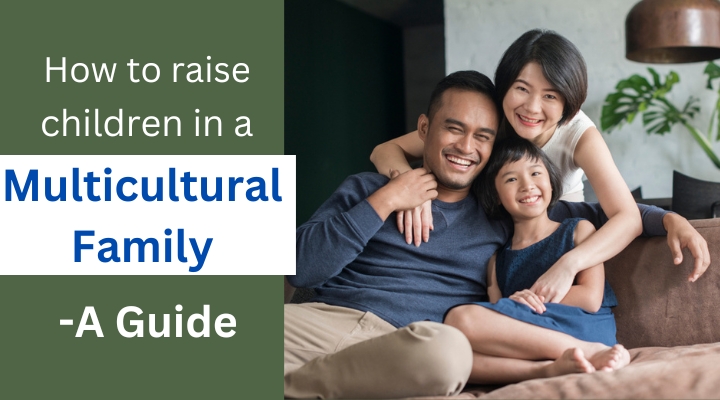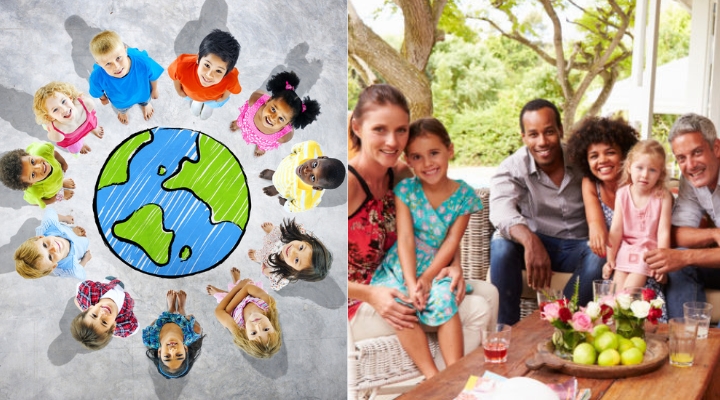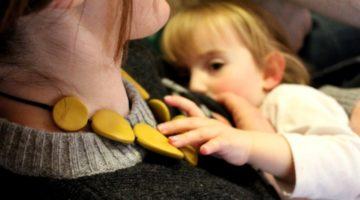How to raise children in a Multicultural Family-A Guide
In an increasingly interconnected world, multicultural families have become a common occurrence. This guide explores, How to raise children in a Multicultural Family-A Guide, fostering a sense of identity, belonging, and understanding. These families bring together individuals from diverse backgrounds, cultures, and traditions, creating a rich tapestry of experiences. However, raising children in such an environment comes with its own set of challenges and opportunities. Navigating the complexities of multiple cultures requires thoughtful consideration and deliberate efforts to ensure a harmonious and well-rounded upbringing.
How to raise children in a Multicultural Family-A Guide
Understanding Multiculturalism
Multiculturalism involves the coexistence of multiple cultural groups within a single society. In a multicultural family, this concept extends to the home environment. Parents may come from different countries, religions, languages, or ethnic backgrounds, enriching the family’s cultural fabric. Understanding and appreciating the significance of each culture is the foundation for nurturing children’s development in such an environment.
1. Celebrate Diversity-
One of the key strengths of a multicultural family is its inherent diversity. Embrace and celebrate the different cultural backgrounds within your family. Make sure to expose your children to various traditions, languages, cuisines, and customs. Celebrate holidays and festivals from both sides of the family, emphasizing the richness of each culture. This not only enhances their cultural awareness but also instills a sense of pride in their unique heritage.
Related- 9 Tips To Balance Your Work And Family Life- As A Parent
2. Open Communication-
Healthy communication is the foundation of any successful family, and this holds even truer in multicultural families. Encourage open dialogues about cultural differences, challenges, and questions that your children might have. Create an environment where they feel comfortable sharing their feelings, confusion, or curiosity. Address any misunderstandings or conflicts as opportunities for learning and growth rather than sources of friction.
3. Bilingualism and Language-
If the parents come from different language backgrounds, consider raising your children to be bilingual. Exposure to multiple languages from a young age not only sharpens cognitive skills but also helps children connect with both sides of their heritage. Speak your native languages at home and expose them to literature, music, and media in those languages. This not only aids in cultural preservation but also enhances cross-cultural communication skills.
4. Cultural Education-
Teach your children about the history, values, and customs of both parental cultures. Incorporate stories, legends, and historical facts into bedtime routines or family discussions. This knowledge will empower them to navigate diverse environments and appreciate the intricacies of their heritage. Consider visiting cultural museums, attending traditional performances, and exploring local community events that showcase different cultures.
Also check How To Deal With Toddler Tantrums And Behavior Issues
5. Respect and Inclusion-
Instill in your children the values of respect and inclusion. Teach them that differences are not to be feared, but rather embraced. Encourage friendships and interactions with peers from various cultural backgrounds. Use age-appropriate books, movies, and stories that promote diversity and highlight the beauty of different cultures. By fostering empathy and an open-minded attitude, you lay the groundwork for them to be respectful global citizens.
6. Flexibility and Adaptability-
Multicultural families often face situations where cultural norms clash. This requires a certain degree of flexibility and adaptability. Approach these situations as opportunities for learning and compromise. For instance, decide together which traditions to prioritize during holidays or how to blend certain cultural practices. This process will help your children develop problem-solving skills and a deep appreciation for compromise.
7. Travel and Exploration-
If possible, expose your children to the countries of their parent’s heritage. Traveling to these places allows them to experience the culture firsthand, connect with extended family, and deepen their understanding of their roots. These experiences can be transformative, broadening their worldview and enhancing their appreciation for diversity.
You can also check- 6 Healthy & Tasty Breakfasts For Your Kids- You Must Know
8. Extended Family Connections-
Strengthen ties with extended family members from both sides of the family. Grandparents, aunts, uncles, and cousins can play a pivotal role in transmitting cultural traditions, stories, and values. Regular interactions or virtual connections can help bridge the geographical gaps and maintain a sense of belonging to both cultural backgrounds.
9. Identity Formation-
Growing up in a multicultural family can lead to questions about identity. Encourage your children to explore their identities, allowing them to embrace all aspects of their heritage. Discuss how their multicultural background is an asset, providing them with a unique perspective that sets them apart in a positive way.
10. Embrace Unity-
While celebrating diversity, also emphasize the unity that exists within your multicultural family. Highlight the shared values, interests, and experiences that bind you together. This unity can serve as a strong foundation for children, especially during times when external influences might confuse their identity.
Raising children in a multicultural family presents both challenges and opportunities. By fostering an environment of respect, communication, and celebration of diversity, parents can create a harmonious and enriching upbringing for their children. The lessons learned from navigating various cultures prepare these children to become compassionate, adaptable, and culturally aware individuals who contribute positively to a diverse world. Through the intentional efforts of parents, the multicultural family can serve as a powerful catalyst for creating a more interconnected and understanding global society.
Frequently Asked Questions-
How can I ensure that my children have a strong sense of cultural identity while growing up in a multicultural family?
It’s important to create an environment where both cultures are celebrated and explored. Expose your children to traditions, stories, and experiences from both sides of the family. Encourage open discussions about their heritage, and let them know that their multicultural background is something to be proud of. Help them understand that their identity is a unique blend of their diverse backgrounds, and support their exploration of both cultures.
What can I do to promote bilingualism in a multicultural family?
Bilingualism can be a wonderful asset for children in a multicultural family. Start by consistently speaking each language at home. Use books, games, movies, and language classes to reinforce language learning. Create opportunities for your children to interact with native speakers of each language, whether through visits to relatives or cultural events. Emphasize that knowing multiple languages opens doors to different cultures and helps them connect with a wider range of people.
How do I address conflicts that arise from differing cultural practices within the family?
Conflicts related to cultural practices are common in multicultural families. Approach these situations with open communication and a spirit of compromise. Involve your children in discussions about traditions and practices, allowing them to voice their opinions and concerns. Seek common ground that respects both cultures. It’s also helpful to educate extended family members about the importance of understanding and respecting diverse practices within the family.
What strategies can I use to teach my children about tolerance and respect for different cultures?
Teaching tolerance and respect begins with modeling these behaviors in your interactions. Encourage your children to ask questions about different cultures and address any misconceptions they might have. Expose them to diverse experiences through books, movies, and cultural events. Engage in conversations about global issues and highlight the value of understanding perspectives different from their own. Encourage them to stand up against discrimination and prejudice.
How do I help my children navigate their multicultural identity, especially if they feel different from their peers?
It’s common for children in multicultural families to grapple with their identity, especially if they feel different from their peers. Foster open conversations about their feelings and experiences. Share stories of prominent individuals who have embraced their multicultural identity and made positive contributions to society. Encourage them to find ways to celebrate their uniqueness and educate their friends about their background. Support groups, cultural events, and mentors from similar backgrounds can also provide a sense of belonging and understanding.










